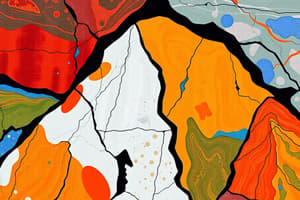Podcast
Questions and Answers
What is Jupiter?
What is Jupiter?
- A dwarf planet
- The closest planet to the Sun
- A gas planet, fifth from the Sun (correct)
- A rocky planet, second from the Sun
Define a lake.
Define a lake.
A large body of water with land all around it.
What is a landform?
What is a landform?
A physical feature on Earth's surface.
What is a landslide?
What is a landslide?
What does larva refer to?
What does larva refer to?
What is lava?
What is lava?
What is the purpose of a leaf?
What is the purpose of a leaf?
What is meant by learned behavior?
What is meant by learned behavior?
What are lenses?
What are lenses?
Define a life cycle.
Define a life cycle.
What is light?
What is light?
What is lighting?
What is lighting?
Define limited consumption.
Define limited consumption.
What is a liquid?
What is a liquid?
What is a liter?
What is a liter?
What is litter?
What is litter?
What is a living organism?
What is a living organism?
Define loam.
Define loam.
What does logical mean?
What does logical mean?
What is low pressure?
What is low pressure?
What is low tide?
What is low tide?
Define lunar cycle.
Define lunar cycle.
What is magma?
What is magma?
What is a magnet?
What is a magnet?
What is magnetism?
What is magnetism?
What does magnify mean?
What does magnify mean?
What is meant by maintain?
What is meant by maintain?
Define mantle.
Define mantle.
What is a map?
What is a map?
What is a map key?
What is a map key?
Who is a marine biologist?
Who is a marine biologist?
What is marine biology?
What is marine biology?
What is Mars?
What is Mars?
Define a marsh.
Define a marsh.
What is mass?
What is mass?
What does matter refer to?
What does matter refer to?
Define measure.
Define measure.
What does mechanical refer to?
What does mechanical refer to?
What is a medium?
What is a medium?
What does melt mean?
What does melt mean?
Define melting point.
Define melting point.
What is mercury?
What is mercury?
What are metals?
What are metals?
What is metamorphic rock?
What is metamorphic rock?
What is metamorphosis?
What is metamorphosis?
Who is a meteorologist?
Who is a meteorologist?
What is meteorology?
What is meteorology?
What is a meter?
What is a meter?
What is a meter stick?
What is a meter stick?
What does method refer to?
What does method refer to?
What is a microscope?
What is a microscope?
What is migration?
What is migration?
What is a milliliter?
What is a milliliter?
What is mimicry?
What is mimicry?
What is a mineral?
What is a mineral?
What is a mirror?
What is a mirror?
What is a mixture?
What is a mixture?
What is a model?
What is a model?
What does molt mean?
What does molt mean?
What is the moon?
What is the moon?
What are moon phases?
What are moon phases?
What is motion?
What is motion?
Flashcards are hidden until you start studying
Study Notes
Astronomy and Planetary Science
- Jupiter: The largest gas planet, fifth from the Sun.
- Mars: A small, rocky planet; fourth from the Sun.
- Mercury: The closest and smallest planet to the Sun.
- Moon: A natural satellite that revolves around a planet.
- Lunar Cycle: Various appearances of the Moon caused by its orbit around Earth.
Water Bodies and Ecosystems
- Lake: A large water body surrounded by land.
- Marsh: An area of water-logged land.
- Marine Biology: The study of organisms in saltwater ecosystems.
- Marine Biologist: A scientist specializing in saltwater living organisms.
Earth and Environmental Science
- Landform: Any physical feature on Earth’s surface.
- Landslide: A sudden collapse of land causing rapid changes to the surface.
- Living Organism: Entities that grow, change, and reproduce.
- Limited Consumption: The practice of controlling resource usage.
Matter and Materials
- Matter: Anything that occupies space and has mass.
- Mass: The quantity of matter in an object.
- Liquid: Matter that takes the shape of its container and flows.
- Metals: Hard, shiny elements that conduct heat and electricity well.
- Mineral: A nonliving solid with a crystal structure found in nature.
Life Cycles and Biological Processes
- Life Cycle: The series of stages in an organism’s development.
- Metamorphosis: Significant changes in an organism's appearance as it grows.
- Larva: The juvenile stage in the life cycle of insects.
- Migration: Seasonal movement of animals for survival.
Physical Processes and Properties
- Lava: Molten rock that erupts during volcanic activity.
- Magma: Liquid rock beneath Earth's surface.
- Melting Point: The temperature at which a solid becomes a liquid.
- Mechanical Energy: Energy stored in an object due to its position or motion.
Scientific Tools and Measurement
- Lenses: Glass or plastic used for refracting light.
- Microscope: An instrument that enlarges small objects using lenses.
- Meter: The fundamental unit of length in the metric system.
- Liter: The basic capacity unit in metric measurement.
Behavioral Science
- Learned Behavior: Actions acquired through experience and teaching.
- Mimicry: An organism's resemblance to another for protection or predation.
Chemistry and Composition
- Mixture: A combination of substances that retain their properties.
- Loam: A nutrient-rich soil composed of a mixture of components.
Weather and Climate
- Meteorologist: A scientist studying weather and Earth's atmospheric conditions.
- Meteorology: The scientific study of weather patterns and climate.
Light and Energy
- Light: A form of energy that illuminates.
- Lighting: Electricity that moves between clouds or from clouds to ground.
Miscellaneous
- Map: A graphical depiction showing geographical features.
- Map Key: A guide explaining symbols on a map.
- Method: A systematic process for conducting an activity.
Studying That Suits You
Use AI to generate personalized quizzes and flashcards to suit your learning preferences.




